Suzanne Woods Fisher's Blog, page 23
December 11, 2017
12 Days of Giveaways: Day 11: Valerie Fraser Luesse

Like Two Trees in a Pod
You never knew what might happen on our annual hunt for the family Christmas tree.
I look around at all the beautifully manicured Christmas trees grown on farms near Birmingham, where I live—and the perfectly shaped, pre-lit artificial ones at Walmart and Hobby Lobby—and I think to myself: Where’s the challenge in that?
When I was a child, growing up in rural Alabama, “putting up the tree” began with a pickup truck and a saw. Daddy would load my cousin Kathy and me into his truck and strike out for the hedgerows framing my uncle’s cotton fields, where cedar trees grew wild. My dad was sort of famous in our family for selecting ugly Christmas trees. To be fair, he had often worked an 8-hour shift in a paper mill before my mother dispatched him to find two trees—one for her and one for her sister—accompanied by a couple of we’re-so-excited-we-can’t-stand-it little girls. So I have to cut Daddy some slack.
I’m sure we must’ve found some of our trees in broad daylight, but in my memories of those Christmas hunts, the air was always crisp and cold, and the sky was slowly turning “dusky dark,” as my mother says. If you’ve never ridden in the back of a pickup with a dusky dark December sky overhead, I’m just as sorry as I can be. It’s grand.
On behalf of our mothers, Kathy and I thought it our duty to steer Daddy, as best we could, toward two suitable trees: triangular in shape, not too tall, not too short, not pencil-thin, and not as big as a barn. But Daddy is both stubborn and imaginative. That’s a mighty dangerous combination in a man. And unlike more cooperative spruces and firs, the cedars around home were wily, unpredictable pieces of foliage. They weren’t at all sure they wanted to be triangles. Looking back, I think it was the challenge of tricking a cedar into becoming a Christmas tree that Daddy loved best.
Everybody knows you can’t cut the top out of a Christmas tree, or there goes the triangle. So you have to work from the bottom up to get the right height. Because the ladies wanted their trees to sparkle before a front window so that passersby would know they had the holiday spirit, they insisted that their trees be pretty “all the way around.” They would have none of Daddy’s “we could turn this bare spot around to the back” arguments.
His most celebrated achievement—one that works its way into most Christmas essays I write because I still marvel at it—was the year he found two trees that were both lush and green on one side and dead-brown on the other. You now what happened next, don’t you? He cut them both down and tied them together with the dead parts facing inward. Presented with two half-dead trees that had been fused into one gloriously green one, my mother was clearly conflicted: Well, that’s the most ridiculous thing I’ve ever heard of . . . but it’s kind of genius too.
Because we never knew what kind of Christmas weather we might have in the Deep South—could be in the 30s, could be in the 60s—we could never count on real snow. So Mama made some. Did you know that if you take Ivory Snow detergent, add water, and whip it with a hand mixer, it will take on the consistency of meringue? It’s true. I don’t think I’ve ever seen a white Christmas, but our tree was always Ivory Snow-tipped.
Fast-forward many years to the beginning of my career in magazines. By then, Mama and all the ladies in our community had succumbed to the convenience of pre-lit artificial trees. No more watering. No more untangling last year’s lights. Sigh. No more tree hunts with Daddy.
So I developed a new hunt of my own. Whenever I traveled, I would search for jaw-dropping Christmas ornaments for my parents’ tree. Mama especially liked the ones from Saks in New York. Over the years, I completely filled that tree with beautiful ornaments, which everybody loved looking at during the holidays.
A couple of years ago, my mother announced that she would no longer put up her big Christmas tree. It’s just too much trouble, she says. For now, all her pretty ornaments are packed away. But I’m thinking . . . I’ve got some time off for Christmas. Daddy’s still got a pickup. And he’s still got a saw. All we need are two half-dead trees, and we’re back in business.
More about Missing Issac
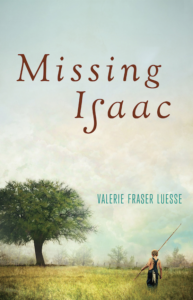 There was another South in the 1960s, one far removed from the marches and bombings and turmoil in the streets that were broadcast on the evening news. It was a place of inner turmoil, where ordinary people struggled to right themselves on a social landscape that was dramatically shifting beneath their feet. This is the world of Valerie Fraser Luesse’s stunning debut, Missing Isaac.
There was another South in the 1960s, one far removed from the marches and bombings and turmoil in the streets that were broadcast on the evening news. It was a place of inner turmoil, where ordinary people struggled to right themselves on a social landscape that was dramatically shifting beneath their feet. This is the world of Valerie Fraser Luesse’s stunning debut, Missing Isaac.
It is 1965 when black field hand Isaac Reynolds goes missing from the tiny, unassuming town of Glory, Alabama. The townspeople’s reactions range from concern to indifference, but one boy will stop at nothing to find out what happened to his unlikely friend. White, wealthy, and fatherless, young Pete McLean has nothing to gain and everything to lose in his relentless search for Isaac. In the process, he will discover much more than he bargained for. Before it’s all over, Pete—and the people he loves most—will have to blur the hard lines of race, class, and religion. And what they discover about themselves may change some of them forever.
Pre-Order a copy of Missing Issac
Amazon | Barnes and Noble | CBD
 Valerie Fraser Luesse is an award-winning magazine writer best known for her feature stories and essays in Southern Living, where she is currently senior travel editor. She grew up in Harpersville, Alabama, a rural community in Shelby County, and now lives in Birmingham with her husband, Dave, and an orange cat named Cheeto.
Valerie Fraser Luesse is an award-winning magazine writer best known for her feature stories and essays in Southern Living, where she is currently senior travel editor. She grew up in Harpersville, Alabama, a rural community in Shelby County, and now lives in Birmingham with her husband, Dave, and an orange cat named Cheeto.





December 8, 2017
12 Days of Giveaways: Day 10: Regina Jennings

Miss Laura Comes to Christmas
When your grandparents own the Mansfield Livestock Auction in Mansfield, Missouri, you never know what you’re going to get for Christmas. There, they had a giant room that used to be the feed store. We kids called it the treasure room—the adults had other names for it.
You see, when people couldn’t get rid of something at their yard sale, they brought it to the auction. My grandpa would always start out the bidding. If no one else bid, then he became the proud owner of whatever was inside the box. Sometimes the treasures – costume jewelry, a giant pig piggy bank, a pair of roller skates – made an appearance under the tree, but most of the treasures stayed in the abandoned feed store and collected dust.
I loved going to the auction with my grandparents and often they would tell me stories about my great-grandpa’s neighbor, Miss Laura. Miss Laura’s husband was crippled and Grandpa Lindsay had to help them when a storm blew the trees over. Miss Laura wrote books and sometimes spoke to ladies’ groups. Miss Laura was buried in the same cemetery as Grandpa Lindsay. My dad remembered meeting Miss Laura.
But I didn’t remember any of that. It was too long ago. I’d rather play with the kids hanging around the auction than hear about an old friend of my grandparents’. I’d met a lot of their friends, and so far none of them were that exciting. But one Christmas, the family conspired to force Miss Laura right into my favorite day of the year.
The wrapped box had looked promising. It was heavy enough to be another pair of roller skates, but it didn’t rattle. What could it be?
Breathlessly, I tore off the paper to find a yellow box of books. The illustrations on the box looked interesting, but then my mom spoke the soul-crushing words:
“Those are Miss Laura’s book.”
Miss Laura? The old lady who used to live next to my great-grandparents? My shoulders slumped. The box slipped out of my hands and thudded against my knee hard enough to leave a bruise. And Miss Laura hadn’t written just one book, but nine books.
Nine. Books.
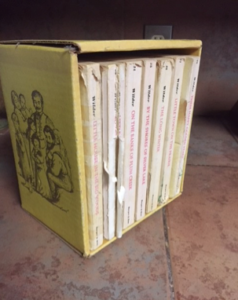
My “Miss Laura’s Books” collection. Some are missing, but all were well-loved.
I couldn’t imagine the torturous hours it would take me to make it through all those pages filled with stories about an elderly woman, but everyone looked so excited, that I knew there was no getting out of it.
And I’m glad I went along. Nothing prepared me for the little girl I met on the first page. This Laura was nothing like the white-headed lady whose picture was pasted inside each cover. This Laura had adventures, she was energetic, and she was always in trouble — just like me. I read those books straight through and on into the new year. I kept reading until I’d finished them all, and then I sat down and started reading the first one again, but this time I read it aloud to my little sister.
Going through the books gave me another way to appreciate my grandparents. Although they hadn’t been covered-wagon pioneers, they’d grown up in an era and a region where many of the homesteading ways were still in use. Now I had questions that they were especially suited to answer. Taffy pull? Making butter? Butchering a pig? Watching their eyes light up as they dusted off long-neglected memories, was more fun than decorating the tree.
And that was perhaps the best gift to come out of that yellow box of Little House books. It was an understanding of how stories can bind years and generations. As unbelievable as it seemed, my grandparents had once been children themselves, and just like Miss Laura Ingalls Wilder, they had stories to tell about when they were children, or young adults, or new parents. Because of those books, I was ready to listen. Maybe before that Christmas, I didn’t truly understand how thrilling our past was, but Miss Laura taught me an appreciation for our history, and for the people who lived it.
More about Holding the Fort
Jennings Winningly Combines Humor, History, and Romance
Louisa Bell never wanted to be a dance-hall singer, but dire circumstances force her hand. With a little help from her brother in the cavalry, she’s able to make ends meet, but lately he’s run afoul of his commanding officer, so she undertakes a visit to straighten him out.
Major Daniel Adams has his hands full at Fort Reno. He can barely control his rowdy troops, much less his two adolescent daughters. If Daniel doesn’t find someone respectable to guide his children, his mother-in-law insists she’ll take them.
When Louisa arrives with some reading materials, she’s mistaken for the governess who never appeared. Major Adams is skeptical. She bears little resemblance to his idea of a governess—they’re not supposed to be so blamed pretty—but he’s left without recourse. His mother-in-law must be satisfied, which leaves him turning a blind eye to his unconventional governess’s methods. Louisa’s never faced so important a performance. Can she keep her act together long enough?
Purchase a copy of Holding the Fort
Amazon | Barnes and Noble | CBD
 Award-winning author Regina Jennings knows a thing or two about auctions, having worked at the Oklahoma National Stockyards as a “Weighmaster” for years. Now she writes historical romances set in the Missouri Ozarks, Oklahoma Territory and exotic places like Texas. She is a graduate of Oklahoma Baptist University with an English degree and a history minor and lives west of Oklahoma City.
Award-winning author Regina Jennings knows a thing or two about auctions, having worked at the Oklahoma National Stockyards as a “Weighmaster” for years. Now she writes historical romances set in the Missouri Ozarks, Oklahoma Territory and exotic places like Texas. She is a graduate of Oklahoma Baptist University with an English degree and a history minor and lives west of Oklahoma City.
Her newest release, Holding the Fort, is set at Fort Reno, Indian Territory, a place not far from home.
Website | Facebook | Twitter | Pinterest






December 7, 2017
12 Days of Giveaways: Day 9: Shawn Smucker

Christmas Race Track
There is the farmhouse. It is warm and old and the nighttime shadows shift in my peripheral vision. I turn quickly but never see what slips around the corner. There is the living room with worn carpet. There is the kitchen, and the mudroom, and beyond that, outside, the field the bull lives in. The church and cemetery across the street. There is the small dining room with its hardwood floor and its solemn door that leads into the other half of the house, the side that is empty and silent.
My family lived on that farm from the time I was six until I was eleven, the most glorious and adventurous time of my childhood. I spent my summers there riding bike around the barns, fishing the Pequea Creek, and hiding in the cemetery across the street. Summer turned to fall: burning leaves and cold nights and frost on the panes. The green faded. Brown settled in. The bare branches scraped together.
Then, the smell of snow. Ice over the puddles. Christmas.
During one particular Christmas I remember receiving three gifts: a metallic globe that sat on a small, plastic stand I accidentally broke (this led to the world rolling through our house from time to time); a digital alarm clock, which meant I could now wake up as early as I wanted and read books before bus #5 picked me up at the end of our long farm lane; and, finally, a race track.
It was the thing I had always wanted: an electric race track with two grand prix cars controlled by two, pistol-shaped controllers. My dad helped me set up the track that Christmas morning, and it was huge. Expansive. Took up half the floor in our small dining room. I laid belly-down on the cold hardwood floor and raced those cars around the track over and over again. The guard rails glowed in the dark. The small motor on the bottom of each car smelled hot – we would put a small dab of oil on the spinning engine to try to cool it down. If I took the corners too fast, the cars skidded off the track, flying across the floor.
I kept the track up for a few weeks, then disassembled it, packed it into a box, and stored it in the attic.
Unpacking it became a Christmas tradition. My dad brought the box down on Christmas Eve and we would carefully put it together again, clicking the tracks into place, testing the cars. And for many years, if I woke up on Christmas morning before my parents, I would lay down on the cool dining room floor and race those cars around the track.
I don’t remember exactly which Christmas was the one we didn’t bring out the race track. Did I feel I had outgrown it? Had we misplaced it? Was it simply overlooked?
I wonder if my parents still have it, tucked away in a box somewhere. It wouldn’t surprise me if they did. I wonder if the cars would still charge around the track, if they’d smell hot after a few laps. I wonder if it would be as amazing as I remember it.
Sometimes, though, things like my old race track aren’t meant to be found. Sometimes, the memories that surround the object, and not the thing itself, become the beautiful parts of a life.
More about The Day the Angels Fell
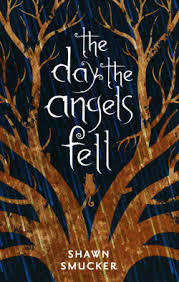 It was the summer of storms and strays and strangers. The summer that lightning struck the big oak tree in the front yard. The summer his mother died in a tragic accident. As he recalls the tumultuous events that launched a surprising journey, Samuel can still hardly believe it all happened.
It was the summer of storms and strays and strangers. The summer that lightning struck the big oak tree in the front yard. The summer his mother died in a tragic accident. As he recalls the tumultuous events that launched a surprising journey, Samuel can still hardly believe it all happened.
After his mother’s death, twelve-year-old Samuel Chambers would do anything to bring her back. Prompted by three strange carnival fortune-tellers and the surfacing of his mysterious and reclusive neighbor, Sam begins his search for the Tree of Life–the only thing that could possibly bring his mother back. His quest to defeat death entangles him and his best friend Abra in an ancient conflict and forces Sam to grapple with an unwelcome question: could it be possible that death is a gift?
Haunting and hypnotic, The Day the Angels Fell explores the difficult questions of life in a voice that is fresh, friendly, and unafraid. With this powerful story, Shawn Smucker has carved out a spot for himself in the tradition of authors Madeleine L’Engle and Lois Lowry.
Purchase a copy of The Day the Angels Fell
Amazon | Barnes and Noble | CBD
 Shawn Smucker is an author, blogger, and co-writer who lives in Lancaster, PA, with his wife and six children. His first novel, The Day the Angels Fell, explores the question of whether it might be possible that death is a gift.
Shawn Smucker is an author, blogger, and co-writer who lives in Lancaster, PA, with his wife and six children. His first novel, The Day the Angels Fell, explores the question of whether it might be possible that death is a gift.
Website | Facebook | Twitter | Instagram






December 6, 2017
12 Days of Giveaways: Day 8: Sarah Loudin Thomas

Celebrating Old Christmas
I love me some Christmas traditions! When I was a child, Christmas included decorating sugar cookies, singing lots of carols in the car, cutting a live tree and then watching Dad wrangle tangled lights, hanging our stockings above the fireplace, and Christmas Day with the cousins.
And in retrospect, ALL of that was better than anything Santa left under the tree.
Today, traditions include a small party of close friends, buying a live tree and stringing it with lights carefully stored from year to year (it IS possible to learn), homemade fudge, and the Christmas Eve service at church.
Of course, loving Christmas and my special traditions means that I’ve always had to fight those day after blahs. Suddenly, it’s all over and there’s nothing left to do but sweep up pine needles and pack the decorations away for another year.
Which may be why I loved learning about the Appalachian tradition of Old Christmas so much. I even mention the holiday in my November release, The Sound of Rain. I guess you could say it’s a sort of contrarian celebration of Christmas Day that’s fast fading away. But I’m hoping we can keep the memory alive another generation or two. And maybe even use it as an excuse to celebrate Christmas twice!
So here’s the scoop. Old Christmas is celebrated on January 6, which originally made me think it had something to do with Epiphany.
Nope.
Even into the 20th century, some folks in the mountains still celebrated January 6 as Christmas Day. Why? Well, mostly out of pure stubbornness, which is a familiar character trait in the Appalachian Mountains.
It seems Julius Caesar used to organize the year around the moon–which never quite worked out. So he took the advice of his astronomers and changed over to a sun-based calendar that turned out to be a mere 11 minutes and some change off each year. The Julian calendar.
Eleven minutes—no big deal–right?
Well, by 1582, the calendar was a whopping 10 days off. So Pope Gregory XIII lopped off the extra minutes, turned the calendar back ten days, and instituted the more precise Gregorian calendar. Nice and tidy.
Except the Protestants pretty much ignored the new calendar set by, gasp, a Catholic. As a result, different parts of Europe were using different calendars. It might be February 11 in London, but February 1 in Paris.
Confusing.
So in 1751 a calendar act was passed to set things straight (the calendar now being off eleven days). It was decreed that September 2, 1752, would be followed by, of all things, September 14, 1752.
Just imagine how you would feel if I told you tomorrow is actually a week and a half into the future. It was practically time travel! There were riots. People thought the government had stolen eleven days of their lives.
And so, some people simply refused to go along. And they continued to celebrate Christmas on the same old day–which now happened to fall on January 6 for anyone who was paying attention to the Gregorian calendar.
The tradition was carried over to America, and in some parts of Appalachia and the South folks still remember celebrating Old Christmas.
As for Granny Jane and me . . . we don’t see any harm in celebrating both.
More about The Sound of Rain
Judd Markley is a hardworking coal miner who rarely thinks much past tomorrow until he loses his brother—and nearly his own life—in a mine cave-in. Vowing never to enter the darkness of a mine again, he leaves all he knows in West Virginia to escape to Myrtle Beach, South Carolina. It’s 1954, the seaside community is thriving, and Judd soon hires on with a timber company.
Larkin Heyward’s life in Myrtle Beach is uncomplicated, mostly doing volunteer work and dancing at the Pavilion. But she dreams of one day doing more—maybe moving to the hollers of Kentucky to help the poor children of Appalachia. But she’s never even met someone who’s lived there—until she encounters Judd, the newest employee at her father’s timber company.
Drawn together in the wake of a devastating hurricane, Judd and Larkin each seek answers to what tomorrow will bring. As opposition rises against following their divergent dreams, they realize that it may take a miracle for them to be together.
Purchase a copy of The Sounds of Rain
Amazon | Barnes and Noble | CBD
 Sarah Loudin Thomas grew up on a 100-acre farm in French Creek, WV, the seventh generation to live there. Her Christian fiction is set in West Virginia and celebrates the people, the land, and the heritage of Appalachia. Sarah and her husband Jim now live in the mountains of Western North Carolina with Thistle–the canine equivalent to a personal trainer pushing them to hike, run, and throw sticks. Sarah is active in her local church and enjoys cooking and–you guessed it–reading.
Sarah Loudin Thomas grew up on a 100-acre farm in French Creek, WV, the seventh generation to live there. Her Christian fiction is set in West Virginia and celebrates the people, the land, and the heritage of Appalachia. Sarah and her husband Jim now live in the mountains of Western North Carolina with Thistle–the canine equivalent to a personal trainer pushing them to hike, run, and throw sticks. Sarah is active in her local church and enjoys cooking and–you guessed it–reading.
Website | Facebook | Twitter | Pinterest






December 5, 2017
12 Days of Giveaways: Day 7: Bethany Turner

Slim Christmas
“Christmas is going to be slim this year…”
If I heard that once throughout my childhood, I heard it, well…each and every year of my childhood. My family has never been independently wealthy, by any stretch of the imagination, and finances were often pretty tight. I didn’t really understand that at the time, of course. Life was pretty doggone good overall. Sure, my sister and I—like most kids—sometimes wanted things that we didn’t get, and sometimes we knew it came down to money, but we were loved, there was good food on the table, and I owned enough property in Eternia to be named queen. (In case you’re not a child of the 80’s, Eternia is the universe He-Man lives in, and I had pretty much all of the He-Man and She-Ra toys. Trust me…that was a big deal.)
So maybe we wouldn’t get a lot of things purchased for us throughout most of the year, but for our birthdays and Christmas, my parents always adopted a “go big or go home” mentality. We went all out for Christmas, every year. And it was never just about the gifts, no matter how abundant the gifts were. There were also candlelight services and live nativity scenes, church choir cantatas and trips to visit my grandparents. It was faith, family, and fun. Every year.
And yet every year, my dad would say, “Christmas is going to be slim this year…”
I know that he meant it. I’m sure that every year, my parents knew how tight money was, and they really were trying to prepare us for fewer gifts. But the thing is, I don’t remember there ever being fewer gifts. In fact, I don’t really remember how many gifts there were at all—except that it always seemed like a lot. When I think about the gifts I received, all I can think about is how great they were. And not because they were the latest and greatest. Sometimes they were, sometimes they weren’t. But my parents have always been fabulous gift givers—both in what they gave, and how they gave it.
I remember the year I got my first CD player. It was brilliant, because they had me open the CDs first. (I can be pretty much certain the year was 1996, because I remember that the CDs were the Motion Picture Soundtrack of Evita and the Original Score of Independence Day. If you don’t know me well, you’ll just have to take my word for it that those were absolutely perfect choices.) I’ll never forget opening those CDs and, as much as I wanted those albums, feeling bad. CD players were just really overtaking the mainstream. We had records and cassettes that we listened to all the time, but my parents didn’t know anything about the new technology, I thought. They had picked up CDs by mistake, I thought. And then I opened the CD player.
Brilliant.
And then there was the time they bought my sister and me tickets to see Mandy Patinkin in concert. (You know…Mandy Patinkin. What teenager doesn’t want Mandy Patinkin concert tickets for Christmas? Okay, feel free to judge me but my love for Mandy Patinkin is true and eternal and burns with the light of a thousand suns.) Rather than just give us the tickets, they gave us a poem first. My mother had written it and, again…brilliant. I don’t remember the whole thing, but it all rhymed and dropped clues about the gift, and was absolutely flawless. This is how it ended:
We know what you’re thinkin’.
You’re going to see…
It didn’t go exactly according to plan. Rather than shout out “Mandy Patinkin!” as the poem had perfectly set us up to do, my sister and I looked at each other and questioningly said, “Abraham Lincoln?”
Of course, that made the memory even more substantial. Still, twenty years later, I can’t hear the phrase “I know what you’re thinking” without mentally reciting, “You’re going to see Abraham Lincoln.” I can’t imagine that I ever will. And that’s the thing. Somehow, year after year, Christmas after Christmas, my parents found a way to give us memories to last a lifetime. And now I have such a desire to do the same for my children.
And every year, I find myself warning them that “Christmas is going to be slim this year,” while smiling to myself because I have a sneaking suspicion that they’re not going to remember it that way at all.
More about The Secret Life of Sarah Hollenbeck
 Becoming a Christian is the best and worst thing that has ever happened to Sarah Hollenbeck. Best because, well, that’s obvious. Worst because, up to this point, she’s made her very comfortable living as a well-known, bestselling author of steamy romance novels that would leave the members of her new church blushing. Now Sarah is trying to reconcile her past with the future she’s chosen. She’s still under contract with her publisher and on the hook with her enormous fan base for the kind of book she’s not sure she can write anymore. She’s beginning to think that the church might frown on her tithing on royalties from a “scandalous” book. And the fact that she’s falling in love with her pastor doesn’t make things any easier.
Becoming a Christian is the best and worst thing that has ever happened to Sarah Hollenbeck. Best because, well, that’s obvious. Worst because, up to this point, she’s made her very comfortable living as a well-known, bestselling author of steamy romance novels that would leave the members of her new church blushing. Now Sarah is trying to reconcile her past with the future she’s chosen. She’s still under contract with her publisher and on the hook with her enormous fan base for the kind of book she’s not sure she can write anymore. She’s beginning to think that the church might frown on her tithing on royalties from a “scandalous” book. And the fact that she’s falling in love with her pastor doesn’t make things any easier.
With a powerful voice, penetrating insight, and plenty of wit, Bethany Turner explodes onto the scene with a debut that isn’t afraid to deal with the thorny realities of living the Christian life.
Purchase a copy of The Secret Life of Sarah Hollenbeck
Amazon | Barnes and Noble | CBD
Bethany Turner is the director of administration for Rock Springs Church in Southwest Colorado. A former VP/operations manager of a commercial bank and a three-time cancer survivor (all before she turned 35), Bethany knows that when God has plans for your life, it doesn’t matter what anyone else has to say. She lives with her husband and their two sons in Colorado.
Website | Facebook | Instagram | Twitter






December 4, 2017
12 Days of Giveaways: Day 6: Lisa Harris

Traditions from the Other Side of the World

I’ve always loved family traditions, and in particular, traditions surrounding Christmas. When I think of the holiday, I imagine snow falling, lit up trees in the living room with beautiful decorations and perfectly wrapped presents underneath, and Bing Crosby playing in the background.
Except our Christmases have rarely looked like that.
We moved to Africa when my kids were 1, 3, and 5. Immediately, everything felt unfamiliar. We were drinking boxed shelf milk, and learning to love biltong, boerewors, and sarmies. We had to figure out new vocabulary with words like bakkie, takkies, robots and zebra crossings. Eventually we ended up finding our own kind of normal through new family traditions and celebrations that mixed our own culture with the country where we were living. And I wouldn’t trade what we ended up with for anything.

Christmas was no exception. December is in the middle of summer in southern Africa, so there is no white Christmas. Instead the flowers are blooming, it’s hot, and half the population, it seems, heads to the beach or on safari. Living in another country has meant that our traditions have changed and evolved over the years, but it’s also taught me about what really matters in life. Things like being together as a family, living out our faith, and giving from the heart.
We decided as a young family living in a different culture, that we needed to start our own Christmas traditions. Because we miss the cold, we typically crank up the wall air conditioner in the living room on Christmas Eve, drink hot chocolate, and play board games while Michael Bublé sings in the background. Everything we eat has to be made from scratch, so we spend a lot of time in the kitchen together preparing for our holiday celebration. We make everyone’s favorite appetizers, everything from cheese sticks to sushi. For Christmas morning, there are always gooey Cinnabon cinnamon rolls (from scratch, of course) and sugar cookies with lots of sprinkles for decorating later in the day. The hot summer means ditching the whole Christmas turkey and stuffing dinner in a kitchen with no air-conditioning and instead throwing a braai (BBQ) outside. Sometimes it means heading to the beach or to Kruger on safari.

One of my fondest Christmas memories is when our car broke down in South Africa. We were living in Mozambique by this time, and couldn’t get back across the border in time for Christmas at home. We ended up staying in some friends’ house who were gone on holiday. With only an artificial tree, our kids worked for hours making their own decorations out of construction paper and glitter. Maybe it wasn’t the traditions we were used to, but it was a Christmas we’ll never forget.
As I was going through some of our old family photos while looking for a specific one for this post, I realized that over the years we’ve actually ended up celebrating Christmas in four countries; the US, South Africa, Mozambique, and Brazil. I couldn’t help but smile at all of our crazy memories, and the fun we’ve had over the past decade and a half. It hasn’t always been easy by any means, but the traditions we’ve built over the years, and the adventures we’ve taken have bonded us as a family, leaving me with no regrets.
Family traditions have a way of doing that. Whether you continue with ones passed down from generation to generation, or start your own new ones, they give your family a sense of identity. A place to belong. Hope and purpose. Which is really what was given to us two thousand years ago though the birth of Jesus. Jesus truly is the one who brings meaning to Christmas. He was God in the flesh. He is perfect and holy and through his death and resurrection gives us the true meaning of Christmas.
More about Vanishing Point
 During Garrett Addison’s first week on the job as a criminal investigator for the Tennessee Bureau of Investigation, his team is called out to a murder scene of a young girl. She’s the third victim in a string of disappearances with one thing in common–a Polaroid photo of each victim left behind at the crime scene.
During Garrett Addison’s first week on the job as a criminal investigator for the Tennessee Bureau of Investigation, his team is called out to a murder scene of a young girl. She’s the third victim in a string of disappearances with one thing in common–a Polaroid photo of each victim left behind at the crime scene.
The FBI is pulled into the case to help, and Garrett finds himself working with Special Agent Jordan Lambert, the woman he once loved. When yet another girl dies–number six–Garrett blames himself and believes he doesn’t have what it takes to be an agent. What he’ll discover is that, while he may be done with the killer, the killer is not done with him–or Jordan.
Bestselling and award-winning author Lisa Harris unveils an unforgettable story of a case that has haunted the public and law enforcement for more than a decade. Fans of the Nikki Boyd Files will thrill to finally discover what actually happened to Nikki’s sister, Sarah. New readers will become instant fans after devouring this chilling tale.
Purchase a copy of Vanishing Point
Amazon | Barnes and Noble | CBD
 LISA HARRIS is a Christy Award finalist for Blood Ransom and Vendetta, Christy Award winner for Dangerous Passage, and the winner of the Best Inspirational Suspense Novel for 2011 (Blood Covenant) and 2015 (Vendetta) from Romantic Times. She has over thirty novels and novella collections in print. She and her family have spent over thirteen years working as missionaries in Africa. When she’s not working she loves hanging out with her family, cooking different ethnic dishes, photography, and heading into the African bush on safari. For more information about her books and life in Africa visit her website at www.lisaharriswrites.com.
LISA HARRIS is a Christy Award finalist for Blood Ransom and Vendetta, Christy Award winner for Dangerous Passage, and the winner of the Best Inspirational Suspense Novel for 2011 (Blood Covenant) and 2015 (Vendetta) from Romantic Times. She has over thirty novels and novella collections in print. She and her family have spent over thirteen years working as missionaries in Africa. When she’s not working she loves hanging out with her family, cooking different ethnic dishes, photography, and heading into the African bush on safari. For more information about her books and life in Africa visit her website at www.lisaharriswrites.com.
Website | Blog | Facebook | Twitter | Pinterest






December 1, 2017
12 Days of Giveaways: Day 5: Jaime Jo Wright

Christmas Memory
My Christmas memory isn’t really my favorite, so much as my worst. To this day, tears pour down my face every time I recall it, and yet, it brought me one of the most important lessons I’ve ever learned.
When I was born, my Grandpa Wright had passed away, so my Gramma Wright was already fit tight into my family like a puzzle piece that completely belonged. She was always there, with her pure white hair, horn-rimmed glasses, and polyester pants. She was the epitome of the chestnuts-roasting-on-an-open-fire type of Gramma. She was round, soft, laughed with musical laughter, always smiled, made delectable fudge, super salty macaroni and cheese, and could out-sing Bing Crosby at any Christmas carol. We would sit by the fireplace when I was little, and sing carol after carol to the old vinyl records spinning on the turntable. Tony Bennett, Nat King Cole, the Carpenters, all the classics that had established themselves long before I was born, but trapped Christmas in this time-capsule of snowy night perfection. The crackling fire was warm, as was Gramma’s arm around me, and the feeling taking root deep inside of me.
When I eight, something dreadful happened. I realized that Gramma was not going to be with us for the holiday as she’d moved to a nursing home. Congestive heart failure was not her friend, and she was weak, and tired, and her voice was a whisper no longer able to be heard above dear, blue-eyed Bing. But then something worse happened.
I opened her Christmas present.
She’d purchased it at the gift shop at the nursing home. It had the ugliest plastic face, with yarn crochet around it like a bonnet, a button under its doll-chin, and two crocheted pot-warmers hanging below. And it was blue and white. I didn’t even like blue. Let alone a plastic faced, two-dimensional kitchen accessory. Last year, she’d given me a Fisher Price kitchen mixer complete with bowl, and play food. My imagination could not stretch beyond crushed disappointment. I tossed the ugly thing away.
A few months later, I was found hugging the garbage can, inconsolable, sobbing and broken.
The ugly doll-pot-warmer was the last gift my Gramma would ever give me. She passed away, leaving a lonely little eight-year-old to celebrate Christmas after Christmas, holding on to memories of fireplaces, vinyl records, and smiles. I had never wanted so
badly to get back a present I’d so thoughtlessly tossed away.
That day, I realized that the giving is the heart behind the gift, not the gift itself.
That useless piece of crocheted ugliness had transformed into a golden treasure, because trapped within it, was the love of my Gramma. She’d wheeled her breathless self to the shop, fingered the old-lady items, probably labored over what might possibly be special to an eight-year-old granddaughter, and picked it from its spot for sale. And I had tossed it away. Thoughtlessly. Thanklessly. Selfishly.
I never did get the doll back. It had long traveled to its destination somewhere in the city dump. To this day, I would sell just about anything if I could only have it back. But I also learned something that, while it still hurts, is even more important: I did not throw away her love.
She loved me. Ohhhhhh, how that woman loved me. It wrapped around me as a child, held me from afar when she was ill, and travelled with her to glory. I remember kissing her in the hospital one night, not long after, and not understanding she was passing away. Her cheek was so soft, so warm. Her voice so whisper-quiet. But as we walked down the hospital hallway to head home, her voice echoed out her hospital doorway and down the hall after me with a strength I will never forget.
“Goodbye!” She warbled after me. “I love you! Goodbye!”
It was our final goodbye. The love of my Gramma followed me home, lives in me now, and will travel with me to her side someday.
Her gift of an ugly crocheted thing became the picture of sacrificial love to me. The power behind her dying voice as she called to me down the hall. She wanted me to know that with Christmas, with life, were the memories. Our memories. She wanted me to know that she loved me.
I know Gramma, I know. More than anything. I. Know.
More about The House on Foster Hill
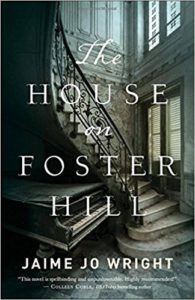 Outstanding Debut Novel from an Author to Watch
Outstanding Debut Novel from an Author to Watch
Kaine Prescott is no stranger to death. When her husband died two years ago, her pleas for further investigation into his suspicious death fell on deaf ears. In desperate need of a fresh start, Kaine purchases an old house sight unseen in her grandfather’s Wisconsin hometown. But one look at the eerie, abandoned house immediately leaves her questioning her rash decision. And when the house’s dark history comes back with a vengeance, Kaine is forced to face the terrifying realization she has nowhere left to hide.
A century earlier, the house on Foster Hill holds nothing but painful memories for Ivy Thorpe. When an unidentified woman is found dead on the property, Ivy is compelled to discover her identity. Ivy’s search leads her into dangerous waters and, even as she works together with a man from her past, can she unravel the mystery before any other lives—including her own—are lost?
Purchase a copy of The House on Foster Hill:
Amazon | Barnes and Noble | CBD
 Professional coffee drinker & ECPA/Publisher’s Weekly best-selling author, Jaime Jo Wright resides in the hills of Wisconsin writing spirited romantic suspense stained with the shadows of history. Coffee fuels her snarky personality. She lives in Neverland with her Cap’n Hook who stole her heart and will not give it back, their little fairy Tinkerbell, and a very mischievous Peter Pan. The foursome embark on scores of adventure that only make her fall more wildly in love with romance and intrigue. Jaime lives in dreamland, exists in reality, and invites you to join her adventures atjaimejowright.com
Professional coffee drinker & ECPA/Publisher’s Weekly best-selling author, Jaime Jo Wright resides in the hills of Wisconsin writing spirited romantic suspense stained with the shadows of history. Coffee fuels her snarky personality. She lives in Neverland with her Cap’n Hook who stole her heart and will not give it back, their little fairy Tinkerbell, and a very mischievous Peter Pan. The foursome embark on scores of adventure that only make her fall more wildly in love with romance and intrigue. Jaime lives in dreamland, exists in reality, and invites you to join her adventures atjaimejowright.com
Website | Facebook | Twitter | Instagram






November 30, 2017
12 Days of Giveaways: Day 4: Jen Turano

The Unexpected Christmas Gift
The Christmas season has always been my favorite time of year. When my parents were alive, Al and I would usually travel back to my hometown to spend Christmas with them. I loved taking my son to the little pond where I learned how to ice-skate, barreling down the sledding hill where there was always the danger of running into a tree, and getting up early to enjoy a cup of coffee with my mom while everyone else was sleeping.
After my mom died in 2005, with my dad following her in 2008, there was no longer any reason to travel back to my hometown for Christmas. Al and I began other traditions with our son, but a few years ago, I found myself missing my mom more than ever. In all honesty, I was in funk. When Christmas Eve arrived, I was still in a dismal frame of mind, but since I didn’t want to ruin the holiday for my guys, I put on a happy face, got ready for the Christmas Eve service, and off we went.
The church was packed, and after finding seats, I was perusing the crowd and saw an elderly woman sitting in the very center of the church, but she was sitting all alone. I’m of the firm belief that no one should be alone on Christmas Eve. Telling my guys we had to move, and not surprised when they exchanged looks because I have the tendency to switch seats often, we headed across the church, scooted our way past people already sitting in that pew, and reached the elderly woman.
Asking her if it would be okay if we’d join her, she looked up and beamed the most beautiful smile at me. Reaching out, she took hold of my hand, proclaimed herself delighted to have me join her and announced that she was Bobbie Jean and had recently celebrated her ninetieth birthday. After introducing my husband and son to her, Bobbie Jean immediately won my heart by saying my husband was quite a dish and my son was obviously charming. Before I knew it, we were chatting away as if we’d known each other for years.
She’d recently lost her husband of almost seventy years, and was in town to visit her son who was singing that night in the choir, which was why she was by herself. When she asked why I wasn’t with my parents, I told her my parents were gone, and giving my hand a squeeze, she said. “And you’re missing your mother, aren’t you?” After that, she never let go of my hand, holding it throughout the service even when we shared a hymnal. The ache I’d been feeling for much of the Christmas season melted away, replaced with a sense of peace I certainly hadn’t been expecting.
When it was time to light the candles, Bobbie Jean tipped the flame of hers to mine, smiling at me when it finally took, and then, she leaned closer and whispered, “That’s my good girl.” I cannot tell you how many times my mom said those exact same words, and in that moment, I felt as if my mom was with me, holding my hand and letting me know that even though she was no longer on this earth, she was still watching over me.
After the service, Bobbie Jean’s son joined us, and before I knew it, it was time to part ways with my new friend. Bobbie Jean pulled me into a hug, called me her delightful girl, kissed me on the cheek, then thanked me for chasing away the ache that had been settled in her heart all day. We then exchanged smiles that didn’t need any words because unconditional love doesn’t need to be explained.
I never saw Bobbie Jean again, nor did I ever see her son at any of the services I’ve attended since. But for that one special night, Bobbie Jean and I were the best of friends, kindred spirits who needed exactly what the other had to give.
For this Christmas season, I wish all of you the blessings of friends and unconditional love, and hope you’ll experience an unexpected gift from God – quite like the gift He sent me, a gift named Bobbie Jean.
Merry Christmas!
~ Jen ~
More about Out of the Ordinary
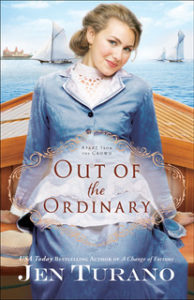 Rollicking New Release from Humorous Historical Romance Author Jen Turano
Rollicking New Release from Humorous Historical Romance Author Jen Turano
Miss Gertrude Cadwalader hoped her position as the paid companion to Mrs. Davenport would be easy. But as she becomes acquainted with her employer, she realizes the wealthy Mrs. Davenport has a strange tendency to be a bit light-fingered with other people’s trinkets. Gertrude is relieved when Mrs. Davenport decides to have a quiet summer away from the social scene–until the woman changes her mind in order to help a young socialite launch into society.
When Gertrude is caught in the act of trying to return one of the trinkets by Mrs. Sinclair, the mother of shipping magnate Harrison Sinclair, the woman jumps to an unfortunate conclusion. Harrison is determined to mend fences with Miss Cadwalader, but he’s unprepared for the escapades a friendship with her will entail.
Purchase a copy of Out of the Ordinary:
Amazon | Barnes and Noble | CBD
 Named One of the Funniest Voices in Inspirational Romance by Booklist, Jen Turano is a USA Today Best-Selling Author, known for penning quirky historical romances set in the Gilded Age. She’s been a finalist twice for the RT Reviewers’ Choice Awards and had two of her books named top ten romances from Booklist. When she’s not writing, she spends her time outside of Denver, CO.
Named One of the Funniest Voices in Inspirational Romance by Booklist, Jen Turano is a USA Today Best-Selling Author, known for penning quirky historical romances set in the Gilded Age. She’s been a finalist twice for the RT Reviewers’ Choice Awards and had two of her books named top ten romances from Booklist. When she’s not writing, she spends her time outside of Denver, CO.






November 29, 2017
12 Days of Giveaways: Day 3: Melody Carlson

A Jolly, Holly Christmas
One of my most memorable Christmases started out as a natural disaster. When I was eight, we experienced the worst flood in recorded Oregon history. It was only a few days before Christmas when our streets became shallow rivers and the governor proclaimed a state of disaster. My sister and I assumed the flood was simply our new water-world playground and didn’t understand the seriousness of washed-out bridges and downed power lines and submerged homes. But when we realized this flood was about to nix our usual three-hour trek to our grandparents’ home near the coast, we were not very merry.
Naturally, our mom, a single parent, protested the sensibility of holiday travel during a state of disaster (most of Oregon’s rivers were involved in the flood and even more so near my grandparents’ coastal home). But Christmas at Grandma’s house was our favorite event of the year. And thanks to our childish persistence, our mom gave in—or maybe she just wanted a little ‘peace on earth.”
So we packed bags and gifts and piled into our 1954 Chevy and headed out. Flood waters climbed higher the closer we got to the coast, taking our usual route—alongside the Umpqua River. We were almost beyond the river, when we learned that the road behind us had been closed due to landslides and flooding. And the one ahead of us was also flooding . . . about to be closed as well. The state policeman looked as flummoxed as our mother, but told us to cross “at our own risk.” What else could he say?
Of course, we urged our mom to go for it, watching nervously as the Volkswagen Bug ahead of us entered into the high water and following not too far behind it. To our shock and concern, the VW started to float away! But my sister and I continued to cheer on our mother—keep going! She had no choice but to continue plowing through the fast moving water, which appeared to be nearly two feet deep! Thankfully our old heavy Chevy did not float away, but the water seeped in through the doors, pooling onto the floors.
We made it safely to the grandparents—with exciting stories to tell. But once there, we learned there would be no Christmas tree. All the roads to the woods, where we normally chopped down a tree, were closed. I’m sure our little faces were full of disappointment. That’s when my grandpa picked up his ax and led us outside. There was a parking strip outside their old Victorian home, where he’d planted a row of holly trees that had grown to around twelve feet tall. To my surprise, he laid into tallest beautiful holly tree with his ax, falling it to the ground. I watched on in horror, certain that Grandma would have a fit—she loved those trees.
My grandpa must’ve seen my shock, chuckling as he explained how the city had told him to remove that tree for traffic visibility around the corner of the intersection. Leave it to Grandpa! So it was we had a twelve foot holly tree for Christmas. It was a little prickly decorating it, but with its shiny green leaves and red berries, it was the most beautiful tree ever! So what the governor proclaimed a disaster turned out to be a jolly, holly Christmas after all.
More about The Christmas Blessing
When she receives the news in late 1944 that her baby’s father was shot down in the South Pacific, Amelia Richards loses hope. Jobless and broke, she has nowhere to turn for help but her infant’s paternal grandparents. The only problem is, they don’t know that she—or their grandson—exists. When Amelia discovers that the family is wealthy and influential, dare she disclose the truth of her relationship with their son? Or could the celebration of the arrival of another unexpected baby nearly two thousand years ago be the answer to her dilemma?
Beloved author Melody Carlson pens a story of love, hardship, and reconciliation that will leave readers filled with Christmas joy.
Purchase a copy of The Christmas Blessing:
Amazon | Barnes and Noble | CBD
 Melody Carlson is the award-winning author of over two hundred books with combined sales of more than six million. She is the author of several books, including the bestselling The Christmas Bus, The Christmas Dog, Christmas at Harrington’s, The Christmas Cat, The Christmas Joy Ride, and The Christmas Angel Project. She received a Romantic Times Career Achievement Award in the inspirational market for her many books, including the DIARY OF A TEENAGE GIRL series and Finding Alice. She and her husband live in central Oregon.
Melody Carlson is the award-winning author of over two hundred books with combined sales of more than six million. She is the author of several books, including the bestselling The Christmas Bus, The Christmas Dog, Christmas at Harrington’s, The Christmas Cat, The Christmas Joy Ride, and The Christmas Angel Project. She received a Romantic Times Career Achievement Award in the inspirational market for her many books, including the DIARY OF A TEENAGE GIRL series and Finding Alice. She and her husband live in central Oregon.






November 28, 2017
12 Days of Giveaways: Day 2: Irene Hannon

The Best Christmas Gift
I love Christmas.
I love what it commemorates—the birth of our Savior, which led to our redemption and the glory of Easter—and I love the special childhood memories it reawakens.
Let me tell you about one of them.
I grew up in a family that was richer in love than material blessings. My dad once worked three jobs to give us the kind of life he never had growing up in a cottage without running water or electricity in rural Ireland. And he was all in with my mom’s plan to make every Christmas one to remember for my brother and me.
During my younger years, we lived with my grandfather in an old two-story home with a slightly uneven floor on the second level, where my mom, dad, brother and I slept. On Christmas morning, my brother and I would wake before dawn and rouse my parents. After my dad checked to make sure Santa had visited, we made our way down the stairs, gaping into a living room lit only by the glow of colored lights from the tree as we took in the wondrous mound of presents waiting to be opened. The beauty and the bounty overwhelmed us.
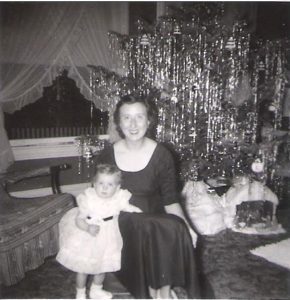 What made this first glimpse extra special was the transformation in the living room. When my brother and I went to bed, it bore no sign of Christmas except for the empty tree stand. After we went to sleep, my mom and dad would set up the live tree, decorate it with lights and ornaments and real tinsel, and haul in all the presents from wherever they were stashed—because Santa brought our tree as well as our gifts. When my brother and I caught our first glimpse in the morning, it was pure magic.
What made this first glimpse extra special was the transformation in the living room. When my brother and I went to bed, it bore no sign of Christmas except for the empty tree stand. After we went to sleep, my mom and dad would set up the live tree, decorate it with lights and ornaments and real tinsel, and haul in all the presents from wherever they were stashed—because Santa brought our tree as well as our gifts. When my brother and I caught our first glimpse in the morning, it was pure magic.
Mom and Dad never faltered during the day, even though they had to be dead tired. Mom always made a wonderful dinner, and Dad assembled whatever toys needed to be put together. I have no idea how they called up the stamina to be so jolly and joyous after staying up half the night.
But they were both committed to creating treasured Christmas memories we would carry with us for always.
Of course, the true meaning of the day was never lost. A crèche was always front and center under our tree, and once dawn broke and all the presents were opened, we went to church. The carols that filled our house were also a reminder of the reason behind it all—Away in a Manger, It Came Upon a Midnight Clear, Angels We Have Heard on High, Silent Night.
It was a storybook kind of Christmas.
But times change…and so do traditions. I lost Mom suddenly fifteen months ago, and Christmas moved to my house last year. That’s when the truth hit home. The days when trees were decorated in the dark of night by loving parents…when wide-eyed children crept down the stairs to see what goodies Santa had brought…when our family circle was complete…were gone forever.
But some things remained the same.
Last year, the centerpiece of the day was still the birth of our Savior. The familiar carols remained part of my celebration, though I sang them as a soloist at our church’s midnight service. My Christmas dinner table was surrounded by family members. Dad continued his role as the beloved patriarch of our clan. God willing, all of that will be true this year, too.
While our holiday is different now, I’ll always have the memories of my magical childhood Christmases. In fact, the first Christmas after I married, I started a new tradition. On the last night before we take our tree down, I pause halfway up the steps to savor the view in our living room—and to remember the joy and magic my parents created for us on a shoestring budget all those years ago.
Looking back, I don’t recall many of the gifts that awaited me each Christmas morning. But I do remember the feeling of contentment and serenity, the sense of all’s right the world, that pervaded our home.
Most of all I remember the love that went into the creation of those special mornings…and filled our home every single day of the year.
That remains the best gift of all.
Postscript: I wrote this post earlier today. This evening, I went over to my mom and dad’s house to help my brother continue the long, slow chore of going through Mom’s things. Right on top of her dresser—which I’ve walked past many times over the last year—we found a laminated Family Circus cartoon from 30 years ago. It shows the mom and dad standing in the doorway watching the children open their presents under the tree, and the dialogue box says, “They won’t know till they’re gone, but the best gifts are the memories they’re making.” Was the timing of this discovery coincidental? Maybe. But it felt almost like a message from Mom—as if she’d been watching over my shoulder and smiling as I penned this post, pleased that I felt as she hoped I would about the legacy she and dad left us of wonderful childhood Christmas memories that are forever etched in my heart.
More about Sandpiper Cove:
 Hope Harbor police chief Lexie Graham has plenty on her plate raising her son alone and dealing with a sudden rash of petty theft and vandalism in her coastal Oregon hometown. As a result, she has zero time for extracurricular activities—including romance. Ex-con Adam Stone isn’t looking for love either—but how ironic is it that the first woman to catch his eye is a police chief? Yet wishing for things that can never be is foolish.
Hope Harbor police chief Lexie Graham has plenty on her plate raising her son alone and dealing with a sudden rash of petty theft and vandalism in her coastal Oregon hometown. As a result, she has zero time for extracurricular activities—including romance. Ex-con Adam Stone isn’t looking for love either—but how ironic is it that the first woman to catch his eye is a police chief? Yet wishing for things that can never be is foolish.
Nevertheless, when Lexie enlists Adam’s help to keep a young man from falling into a life of crime, sparks begin to fly. And as they work together, it soon becomes apparent that God may have a different—and better—future planned for them than either could imagine.
Lauded by Library Journal as “a master at character development,” Irene Hannon welcomes readers back to this charming Oregon seaside village where hearts heal—and love blooms.
Purchase a copy of Sandpiper Cove:
Amazon | Barnes and Noble | CBD
 Irene Hannon is the bestselling author of more than fifty novels, including One Perfect Spring, Hope Harbor, and Sea Rose Lane, as well as the Private Justice and Men of Valor suspense series. Her books have been honored with three coveted RITA Awards from Romance Writers of America, two Carol Awards, two Reviewers’ Choice Awards from RT Book Reviews magazine, a Retailers’ Choice Award, three HOLT Medallions, two Booksellers’ Best Awards, and a National Readers’ Choice Award. She is also a two-time Christy Award finalist. In 2014 she was inducted into the Romance Writers of America’s elite Hall of Fame, and in 2016 she received a Career Achievement Award from RT Book Reviews for her entire body of work.
Irene Hannon is the bestselling author of more than fifty novels, including One Perfect Spring, Hope Harbor, and Sea Rose Lane, as well as the Private Justice and Men of Valor suspense series. Her books have been honored with three coveted RITA Awards from Romance Writers of America, two Carol Awards, two Reviewers’ Choice Awards from RT Book Reviews magazine, a Retailers’ Choice Award, three HOLT Medallions, two Booksellers’ Best Awards, and a National Readers’ Choice Award. She is also a two-time Christy Award finalist. In 2014 she was inducted into the Romance Writers of America’s elite Hall of Fame, and in 2016 she received a Career Achievement Award from RT Book Reviews for her entire body of work.









